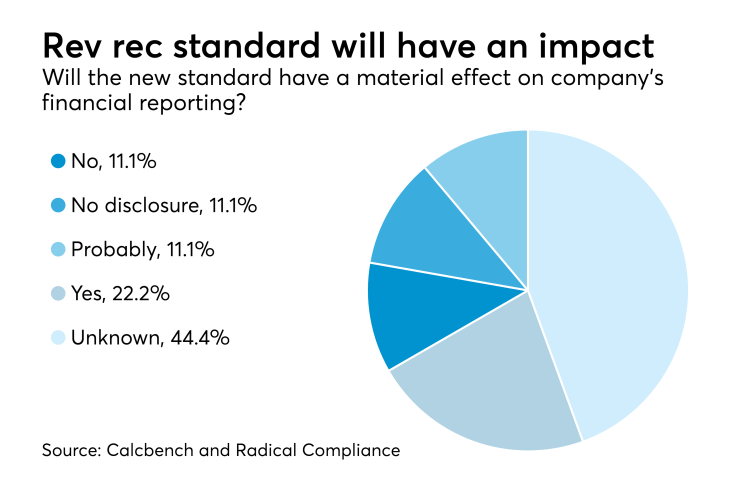The upcoming revenue recognition standard is likely to accelerate the earnings of many software companies, with many developers likely to transition from upfront license sales to subscriptions, according to a new report.
The report, from Moody’s Investors Service, predicts the new standard will accelerate the recognition of revenue and particularly affect the software industry. To understand the impact, Moody’s examined the required public disclosures about the upcoming change for 16 software companies. Ten of the 16 companies disclosed that they anticipate a material acceleration of previously deferred revenue, while two companies are still evaluating the impact of the Financial Accounting Standards Board's new standard. Moody's isn't expecting the change to affect their credit ratings, however.
“In the most recent annual reporting period, these 16 companies deferred revenue in excess of $70 billion,” said the report. “We do not expect the acceleration of revenue will impact ratings as companies' underlying economics will remain unchanged.”
The report noted that Microsoft adopted the new revenue recognition guidance in its first fiscal quarter ending Sept. 30, 2017. Under the new standard, Microsoft’s restated annual financials for 2017 and 2016 are expected to present a net increase in reported revenue of approximately $6.5 billion and $5.9 billion, respectively. Moody’s pointed out that Microsoft used a combination of non-GAAP numbers and gave a thorough presentation on the accounting change to help prepare investors for the shift in timing and the impact of the revenue changes on various credit metrics.
FASB is giving companies a choice of how to transition to the new standard. Microsoft used the full retrospective adoption method to provide investors with comparable numbers on the face of its financial statements. But only three of 16 technology companies Moody’s examined have disclosed the use of a full retrospective adoption for the revenue recognition standard, also referred to as Topic 606 or ASC 606, according to its number in the FASB Accounting Standards Codification. “We expect the balance of companies will use the more cost-effective modified retrospective approach, which allows for only a restatement of customer contracts in process that cross the adoption date,” said the report.
Moody’s also talked to Intuit, which told the researchers, “Due to the upfront recognition of QuickBooks desktop solutions, upon adoption, we will remove deferred revenue from our liabilities through a cumulative adjustment to retained earnings. We do not expect our annual revenue growth rates to be significantly different under Topic 606, but we do expect the timing of quarterly revenue recognition to be different as a result of these changes.”
Another major software company, Oracle, said, "The adoption of Topic 606 will result in additional types of costs that will be capitalized. Additionally, all amounts capitalized will be amortized over a period longer than our current policy. Preliminarily, we plan to adopt Topic 606 in the first quarter of fiscal 2019 pursuant to the aforementioned adoption method and we do not believe there will be a material impact to our revenues upon adoption."
While Moody’s predicts that more software companies will move to a subscription model, as opposed to upfront licensing fees, Tien Tzuo, chief executive of Zuora, a company that specializes in software for managing subscriptions, believes that many companies that rely on traditional subscription licenses also aren’t ready for the new standard (see
“We should be a little worried,” he told Accounting Today in September. “There’s a surprise looming when earnings season kicks off at the start of next year and I don’t think we’re ready for it.”
A new survey by another software company, Aptitude Software, also suggests that listed U.S. technology companies may not be ready to comply with ASC 606 by the implementation deadline of January 2018. It estimates that 70 percent of public companies in the U.S. technology sector may be non-compliant when new rules take effect as the average implementation time for the new standard is six months.
Of the 431 Nasdaq-listed technology businesses, Aptitude predicts that seven out of 10 will miss the initial compliance deadline, leading to potential market uncertainty next year. While the initial implementation of the new standard can occur within three months, companies with complex balance sheets typically need to have an extra quarter to deal with the volume of data and recast their results.
Aptitude's analysis backs up the findings from a survey in March by Ernst & Young of CFOs, which found that more than 70 percent of U.S. companies don’t have their revenue recognition programs complete. More than one-third of companies are experiencing challenges and at risk of falling behind schedule, including 14 percent of companies who have not yet begun, according to the EY survey.
Aptitude anticipates investor decisions could be disrupted or delayed by the impact of delayed compliance with the new standard.
“Investors are accustomed to making decisions based upon traditional key performance indicators,” said Rajiv Chopra, who leads Aptitude’s newly acquired RevStream business, in a statement. “The absence of comparable metrics is sure to throw significant investment decisions into disarray.”






